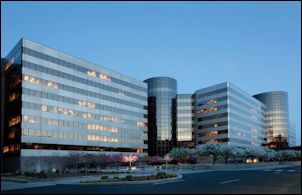by James A. Bacon
As budgetary pressures continue to squeeze federal spending in the Washington metropolitan area, who will assume the mantle of economic growth in the region? An unlikely champion has emerged — Inova Health Systems, Northern Virginia’s dominant health system. The company announced yesterday its intention to lease and ultimately purchase Exxon Mobil’s 117-acre campus to house a world-class facility dedicated to genomics and personalized medicine.
The story is fascinating in many ways: first, for the ambitious thinking behind the venture, which sounds like it has a legitimate shot at success; and second, for what it says about the economic clout of Virginia’s major health care systems.
Genomics and personalized medicine is one of the hottest areas of medical science today. The human genome contains about 23,000 genes, the variations in which account for much of the difference in how individuals respond to chemotherapy-based cancer treatment. The goal is to tailor treatments for a patient’s specific genome — to “personalize” medicine — to attack cancer cells while minimizing side effects.
Under the vision laid out by Inova CEO J. Knox Singleton, the health system will establish a world-class facility, akin to the prestigious Mayo Clinic, that can recruit top physicians and draw patients from around the country, according to the Washington Post.
Inova has several advantages. First, the Washington region is a prestigious, world-class metropolitan area, which should aid in recruiting world-class scientific talent. Second, Inova’s flagship hospital, Inova Fairfax Hospital, is situated right across Gallows Road from Exxon Mobil, a campus assessed at $193 million in value. Third, while not in the same biotech league as Boston, San Francisco or San Diego, Northern Virginia does have significant assets, most notably the Howard Hughes Medical Institute. (See a list of biotech assets.) Fourth and most intriguingly, the data-intensive field of genomics could draw upon the region’s strength in IT. Writes the Post:
Singleton said the use of translational medicine to develop treatments for cancer and other diseases could be accelerated by taking advantage of Northern Virginia’s expertise in cloud computing and data analytics.
“The beauty of Northern Virginia is we’re building in sort of a greenfield when it comes to this personalized medicine, genomics research,” Singleton said. “But when you look at the big data and bioinformatics capacity, there are a ton of companies in Northern Virginia who are extremely sophisticated and well-advanced; they’ve just been working on cybersecurity or weather forecasting.”
Oh, and there’s one more advantage Inova brings to the venture: It is an incredibly profitable non-profit company. In 2013 (the most recent figures I could find), Inova generated operating income of $132 million. That profit is non-taxable. Not only can Inova make philanthropic appeals to the community — the Peterson Family Foundation also announced yesterday a $10 million gift to recruit cancer specialists — it can tap the cash thrown off by its own operations. Nobody else, not even the Commonwealth of Virginia, has that kind of money to pump into an economic development project.
It remains to be seen whether the state will contribute to the effort. A key component of the project will be a new medical school. The Post notes that Singleton has not yet struck a deal with a college or university to operate the school. Governor Terry McAuliffe told the Post the state had not been approached for funding, and he did not expect to provide it. “This is all being done privately, which is great.” But you can bet your bottom dollar that George Mason University would love to get into the medical school business, which could require some level of state support. It will be interesting to see how this plays out.
As an aside, there are parallels between Inova’s plans and the Virginia Tech Carilion School of Medicine, a partnership between Carilion Health System in Roanoke and Virginia Tech, which combines “Virginia Tech’s world-class strength in basic sciences, bioinformatics, and engineering with Carilion Clinic’s highly experienced medical staff and rich history in medical education to train the next generation of physician thought leaders.” The medical school in Roanoke, which averages 42 students, had a $59 million bond package included in a state bond issue. Don’t think that Singleton hasn’t considered that precedent.
As promising as the project sounds, caution is warranted. Inova made a similar splash in 2009 when it announced plans for a $200 million Ignite Institute, which also had a focus on genomics and personalized medicine. That project fizzled, and Ignite moved to Philadelphia instead. As GenomeWeb explained in a 2010 article:
That plan collapsed after Inova Health Systems withdrew a commitment to provide $25 million over five years to the institute, citing in a statement, “The scope and scale of the project and the time needed for capital development in the current market.” Inova’s pullout, in turn, prompted Fairfax County to retreat from its own plan to partially finance the permanent facility by issuing up to $150 million in Fairfax County Economic Development Authority industrial revenue bonds.
Hopefully, Inova has learned from the experience, and the financial chemistry will be different this time.



